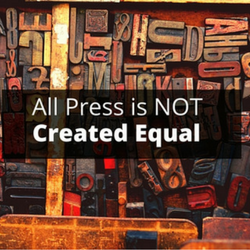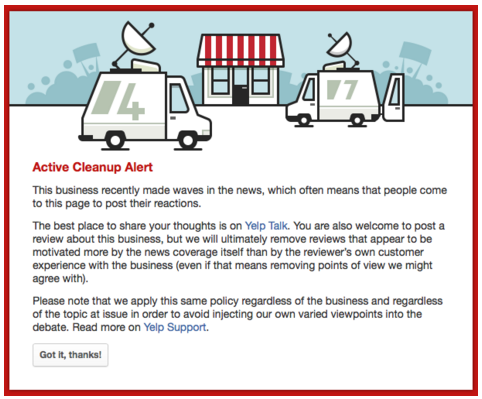
Any Press is Not Good Press on Social
Remember the old adage that says that “any press is good press?” It turns out in the age of social media, this concept might not hold as true. Just ask Walter Palmer, of River Bluff Dental in Minnesota. His name might not sound familiar, but the name Cecil the lion might. In a story that became international news, Palmer killed Cecil in Africa while on a hunting trip. The backlash came from the fact that the lion was extremely popular amongst tourists in the area and the circumstances surrounding the killing were somewhat nebulous.
Now the takeaway from this post is not to be more judicious when hunting lions in Africa. Likely, none of us will ever be in a similarly hairy situation. Rather, the key takeaway from this post is that your online reputation is crucial for your business. Social media is equivalent to exponential word of mouth and you must work hard to maintain your reputation.
This case is clearly an extreme example, but a quick Yelp search of Walter Palmer, DDS showed this image:

His business received 1000’s of negative reviews and now if someone wanted to look up an actual review of his business, it is quite difficult. In addition to the damage on Yelp, we were also not able to find an official Facebook page for his business. The page was likely deleted after the scandal and now only fake pages mocking Palmer remain. Think about the permanent damage that has been done to River Bluff’s reputation.
 To contrast the tale of River Bluff Dental, take a brief look at this story about Dave Kerpen and his trip to Loews Royal Pacific Resort in Orlando, Florida. Did Loews really think that over 3 years later, almost 25,000 people would know about how they went out of their way to please one unhappy guest?
To contrast the tale of River Bluff Dental, take a brief look at this story about Dave Kerpen and his trip to Loews Royal Pacific Resort in Orlando, Florida. Did Loews really think that over 3 years later, almost 25,000 people would know about how they went out of their way to please one unhappy guest?
It’s hard to imagine that not one of those 25k readers stayed at Loews the next time they were in Orlando. The initial cost of fixing their mistake was surely covered, and then some, if even one reader of that post was influenced to stay there. Dave’s story further gives credence to the fact that social ROI does exist and is very dependent on your online reputation.
In a customer facing business, you’re constantly bombarded by people’s personal opinions. Some positive and some… not so much. It’s impossible to say how many business owners are scared to approach social media due to their fear of negativity, but it’s probably more than you would think. Sure, individuals can say whatever they want online, but with a few simple tips you can easily combat (or simply prevent) negativity on social media:
1. Listen, Listen, and Then, You Guessed it, Listen
The fact that consistent listening is a pillar of any social strategy should be common sense, right? Well, it turns out that common sense isn’t so common. Not everyone is going to directly @mention you every time they are dissatisfied with your product or service. You are going to have to do some active listening by searching for what people are saying, not only about you, but also about your competition. However, this has been made much easier in recent years by listening software that enables you to search for specific keywords by platform.
2. Do Not Panic
So, someone on Twitter just said your service is worse than the Hindenburg and the Titanic combined. You are feeling hot in the face and are not quite sure what to do. Depending on your seniority level, you might want to first consult with someone else at your company. Whatever you do, do not panic. Do not send out a rash reply. Just keep calm and follow the next two steps.
3. Do Not Delete or Ignore
Unless a comment is obscene, profane, bigoted, or it contains someone’s personal and private information, never delete negativity from a social network site or blog. This sounds counterintuitive, right? Think again. Deleting comments shows that you’re either hiding something or do not care about what these people have to say.
The next impulse would be to simply ignore it. However, this is just as bad if not worse. No response is a response! Like deleting a comment, ignoring negative feedback sends out the message that your customers’ opinions do not matter. That’s not the impression you want to make on social media.
4. Respond Quickly and Resolve Immediately
The first step towards resolving the issue is responding publicly. This shows that you are straightforward and honestly looking to fix the problem. After initially grabbing their attention, take it private to demonstrate that you take personal responsibility for the issue at hand. Also, this will allow for a free exchange of information, so you can fully rectify the situation. Just remember, the four most important words in social are “I’m sorry” and “Thank you.”
5. Incentivize for Positive Feedback
Try to encourage positivity to bloom on your social channels. Create incentives such as discounts or competitions to incentivize your customers to post positive reviews online.
It’s a fact that unhappy people are more likely to write reviews than happy ones. Try to coax your pleased customers out of the woodwork with incentives! Incentives give them a reason to remember your business fondly and in turn write messages of positivity, balancing out any negativity in sight.
Let’s face it, no one is perfect, and complaints are unavoidable. However, there are ways to resolve any unhappiness that may appear on your social media pages. Address the problem head on, do your best to resolve it, and go above and beyond to surprise the unhappy party and turn them into a fan. Closing your eyes and denying the existence of negativity will only compound the initial problem.
The above article was contributed by Likeable Local. Join BrandYourself CEO Patrick Ambron and Likeable Local CEO Dave Kerpen for the free joint webinar, “5 Hacks to Turn Online Negativity Into Rave Reviews for Your Business” on Thursday March 3rd at 12pm EST.
